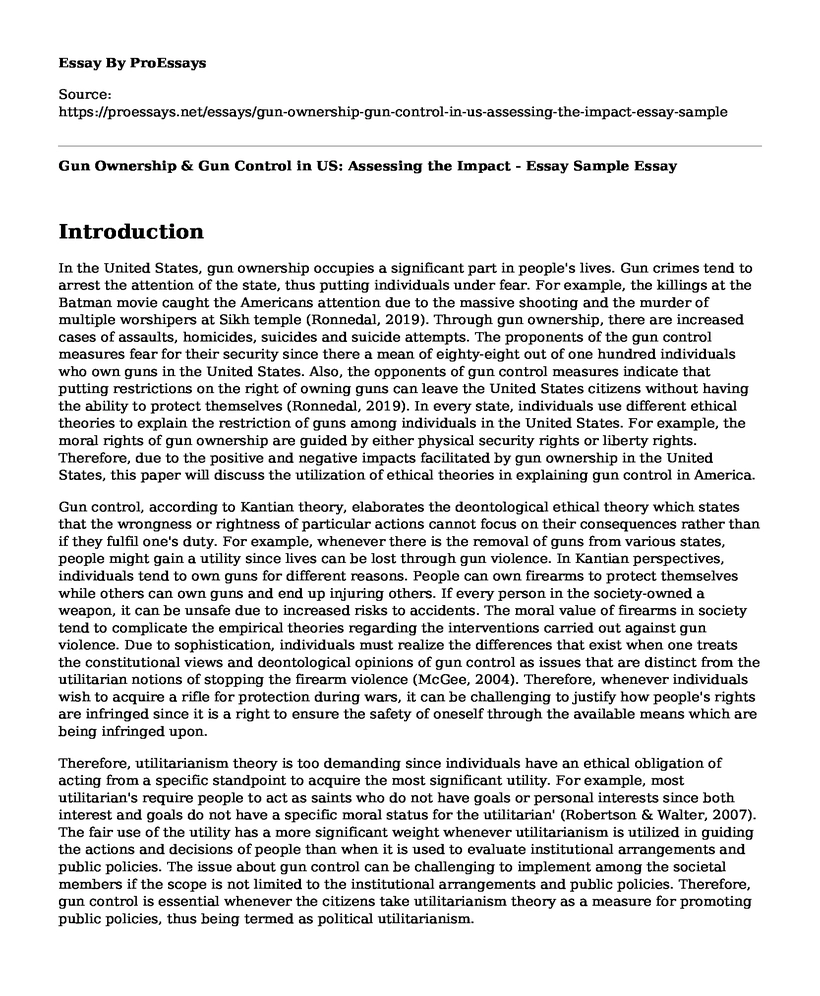Introduction
In the United States, gun ownership occupies a significant part in people's lives. Gun crimes tend to arrest the attention of the state, thus putting individuals under fear. For example, the killings at the Batman movie caught the Americans attention due to the massive shooting and the murder of multiple worshipers at Sikh temple (Ronnedal, 2019). Through gun ownership, there are increased cases of assaults, homicides, suicides and suicide attempts. The proponents of the gun control measures fear for their security since there a mean of eighty-eight out of one hundred individuals who own guns in the United States. Also, the opponents of gun control measures indicate that putting restrictions on the right of owning guns can leave the United States citizens without having the ability to protect themselves (Ronnedal, 2019). In every state, individuals use different ethical theories to explain the restriction of guns among individuals in the United States. For example, the moral rights of gun ownership are guided by either physical security rights or liberty rights. Therefore, due to the positive and negative impacts facilitated by gun ownership in the United States, this paper will discuss the utilization of ethical theories in explaining gun control in America.
Gun control, according to Kantian theory, elaborates the deontological ethical theory which states that the wrongness or rightness of particular actions cannot focus on their consequences rather than if they fulfil one's duty. For example, whenever there is the removal of guns from various states, people might gain a utility since lives can be lost through gun violence. In Kantian perspectives, individuals tend to own guns for different reasons. People can own firearms to protect themselves while others can own guns and end up injuring others. If every person in the society-owned a weapon, it can be unsafe due to increased risks to accidents. The moral value of firearms in society tend to complicate the empirical theories regarding the interventions carried out against gun violence. Due to sophistication, individuals must realize the differences that exist when one treats the constitutional views and deontological opinions of gun control as issues that are distinct from the utilitarian notions of stopping the firearm violence (McGee, 2004). Therefore, whenever individuals wish to acquire a rifle for protection during wars, it can be challenging to justify how people's rights are infringed since it is a right to ensure the safety of oneself through the available means which are being infringed upon.
Therefore, utilitarianism theory is too demanding since individuals have an ethical obligation of acting from a specific standpoint to acquire the most significant utility. For example, most utilitarian's require people to act as saints who do not have goals or personal interests since both interest and goals do not have a specific moral status for the utilitarian' (Robertson & Walter, 2007). The fair use of the utility has a more significant weight whenever utilitarianism is utilized in guiding the actions and decisions of people than when it is used to evaluate institutional arrangements and public policies. The issue about gun control can be challenging to implement among the societal members if the scope is not limited to the institutional arrangements and public policies. Therefore, gun control is essential whenever the citizens take utilitarianism theory as a measure for promoting public policies, thus being termed as political utilitarianism.
References
McGee, R. W. (2004). Property Rights vs Utilitarianism: Two Views of Ethics. Andreas School of Business Working Paper. Retrieved from https://reasonpapers.com/pdf/27/rp_27_4.pdf
Robertson, M., & Walter, G. (2007). Critical reflection on utilitarianism as the basis for psychiatric ethics. Retrieved from https://jemh.ca/issues/v2n1/documents/JEMH_V2N1_Article1_UtilitarianismAsAnEthicalTheory.pdf
Ronnedal, V. S. S. (2019). The Politics of Gun Control in the United States. Leviathan: Interdisciplinary Journal in English, (5), 46-59. Retrieved from https://www.kas.de/documents/252038/253252/7_dokument_dok_pdf_21614_2.pdf/7994b9b1-b6de-f85d-3b38-0f690315649e?version=1.0&t=1539660252829
Cite this page
Gun Ownership & Gun Control in US: Assessing the Impact - Essay Sample. (2023, Apr 01). Retrieved from https://proessays.net/essays/gun-ownership-gun-control-in-us-assessing-the-impact-essay-sample
If you are the original author of this essay and no longer wish to have it published on the ProEssays website, please click below to request its removal:
- Essay Example: Theories and Models of Criminal Justice
- Cyrus the Great and the Cyrus Cylinder Essay
- The Origin of American Democratic Ideals Essay
- Media Exposure and Violent Crimes - Essay Sample
- Essay on the Unrewarded Labor of African Americans: A Trace of Economic History
- Expository Essay on Ethical and Legal Issues in Healthcare
- Paper Example on Mr. Watson's Case: Equitable Claim, Breach of Contract & More







